Let Your Creativity Flow with Distressed Texture
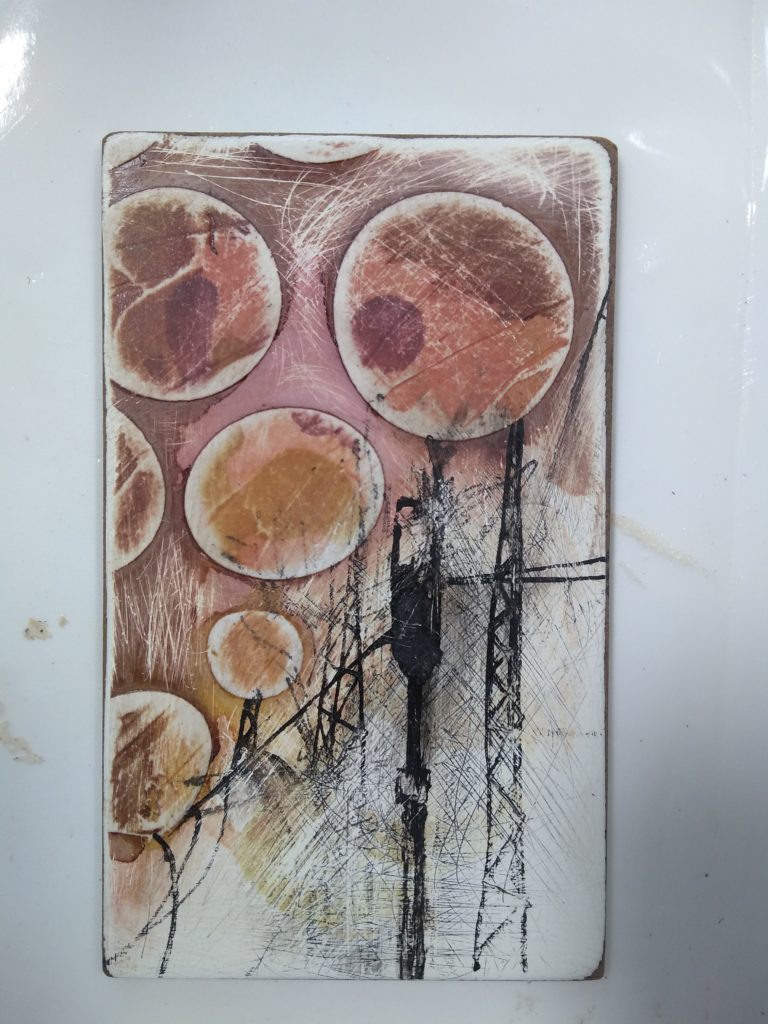
Do you have a passion for color? Do you revel at the sight of color running a little wild? If so, you’ll want to explore the unlimited possibilities of fluid art using Marabu’s new Alcohol Inks and Aqua Inks on Ampersand Claybord.
No artist likes to get stuck in a rut. To keep the creative fires burning, it’s important to continue to explore new tools and materials, to experiment with new techniques, and to make some space in your art practice for creative play. Here’s a project that will help you do all of those things using Marabu’s new Alcohol Inks on Ampersand Claybord™.
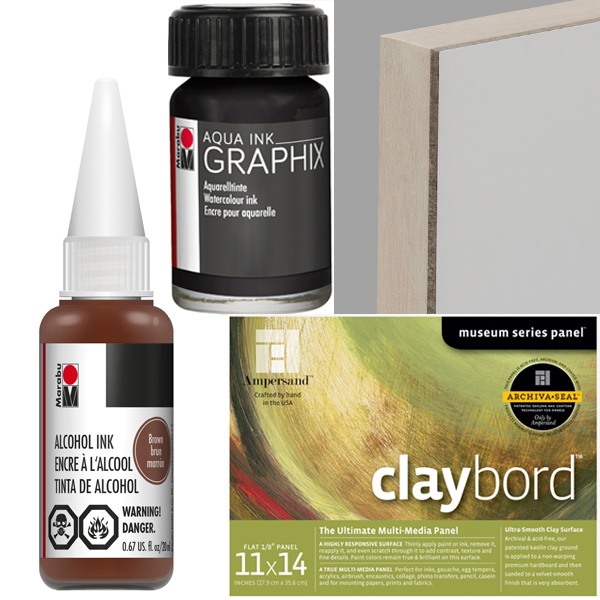
Whether you’re looking to add a new technique to your mixed-media repertoire or just looking to have some fun, these vibrant and versatile inks offer endless potential for your creative explorations. Claybord is the perfect surface for alcohol inks because of the way the clay ground disperses the ink for incredible results.
Try This! Texture and Distress in Fluid Art

Most artists know that alcohol inks will blend and flow beautifully on non-porous surfaces such as metal, glass and glossy papers, but you can also achieve really interesting results using alcohol inks on highly absorbent surfaces, such as Ampersand Claybord.
Claybord works wonderfully with all types of mixed media techniques because of the unique way it’s made. It begins with Ampersand’s premium Hardbord, then sealed with Archiva-Seal before a kaolin clay ground is applied. Claybord is then sanded to an ultra-smooth finish so you can easily manipulate pigments and etch in incredible detail. For example, when working with ink, graphic markers, pencils, and thin applications of paint, you can scratch through the application to add interesting contrasts and textures. You can even completely erase the material from the surface with oil-free steel wool or a very fine sandpaper, without affecting the integrity of the surface.
Marabu Alcohol Inks come in a vibrant palette of colors that deeply stain the Claybord’s ultra-smooth finish, allowing you to distress certain areas for a matte finish that contrasts with the inks’ normally glossy appearance. Additional texture can be created with the use of molding paste. Another amazing benefit of working on Amersand’s Claybord is when your artwork is complete, simply apply a fixative coating over your masterpiece and display it without glass.
Sponsored by Marabu and Ampersand
Materials List
- Marabu Alcohol Inks and Extender
- Marabu Aqua Ink and dip pen
- Ampersand Claybord
- Molding paste
- Stencil
- Palette knife
- Oil-free steel wool and/or fine-grit sandpaper
- Paper towels

Step 1 (A and B)


Apply molding paste to the Claybord through a stencil with a palette knife. Allow it to dry thoroughly.
Step 2 (A, B and C)



Randomly drip a few different colors of alcohol inks (we used analogous colors) onto the stenciled board, blending with a folded piece of paper towel. Explore the different ways the wet inks interact with dry areas of color on molding paste textures versus the untreated areas in between. You can increase the flow of the ink with the Extender.
Step 3 (A, B and C)



Once the inks are dry, distress the appearance by lightly sanding the surface. You can create different kinds of lines and textures with sandpaper versus steel wool, so experiment! The high points of the molding paste will release more color, leaving deeper tones in the recessed areas of your stencil pattern.
Step 4
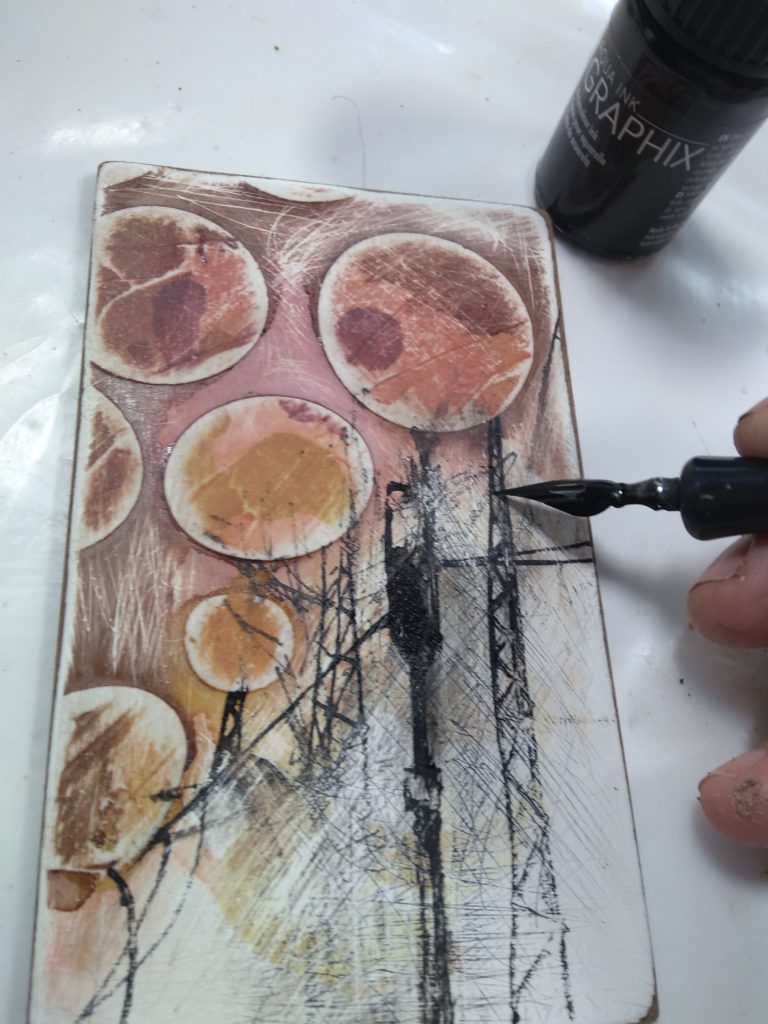
Use a dip pen with Marabu Aqua Ink to sketch and add fine lines. The bold colors of this water-based medium in the foreground contrast nicely with the distressed stains and textures created with the Alcohol Inks in the background.
About Ampersand Claybord
Ampersand is dedicated to supporting artists in their creative process by providing surfaces that are not only a joy to create on, but that will also withstand the test of time. Only Ampersand uses true high-density hardboard made from US-grown renewable Aspen wood fibers, ensuring your panel will not warp.
Ampersand’s commitment to quality and archival principles led them to engineer the only archivally sealed panels on the market today. Every Claybord panel is protected by their proprietary Archiva-Seal barrier technology, the most advanced formula for sealing wood that prevents support induced discoloration, (SID).
The cradles of Claybord are built by hand with premium grade 13-ply birch plywood for maximum stability and a clean finished look from edge to edge. Claybord is available in a wide range of standard sizes, from 4 x 4” up to 36 x 48”, and in 1/8” flat formats, as well as cradle depths of ¾”, 1.5”, and 2”.
Claybord is hand-crafted in the USA, made from FSC certified products that promote sustainable forests and does not contain any residual oils, formaldehyde, or adhesives.
Just in time for gift making, (or simply stocking up your studio), Claybord and Claybord Box kits are on sale at up to 50% off at select retailers. To find a retailer near you, click here.
About Marabu
Creativity is infinite. Marabu provides a complete range of colors, mediums and tools for you to imagine creativity in all its forms including their Alcohol Inks used in this colorful demo. They provide creative ideas, valuable tips, starter sets and step-by-step instructions so artists and hobbyists can be successful with any creative project. To find a Marabu retailer near you, click here.
About the Artist
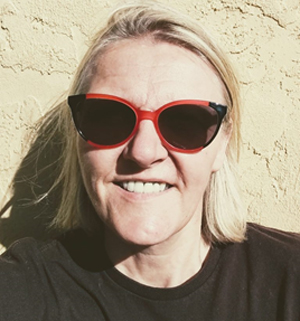
Marabu Artist Educator and mixed media artist Celia Buchanan holds a B.A. in 2-D surface design from Duncan of Jordanstone College of Art, Dundee, Scotland, and an M.A. in arts management in education from the City University, London. Celia’s work has been featured in galleries notably the Institute of Education, London, National Exhibition Center, U.K. and The London Design Center. The author of several books and magazine articles on surface design and fiber arts, Celia has been working in her field for over three decades and teaches throughout the USA.
By exploring creative mixed-media techniques like these, you can enjoy working with a much wider variety of media and surfaces. Give it a try! Click here to watch mixed media artist Celia Buchanan demonstrate this project.





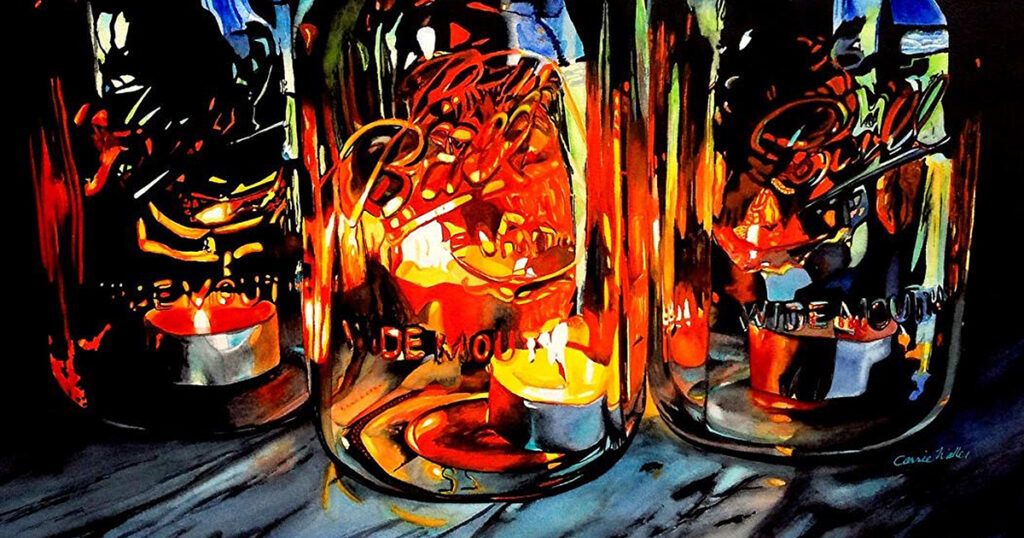
Have a technical question?
Contact UsJoin the Conversation!